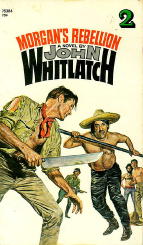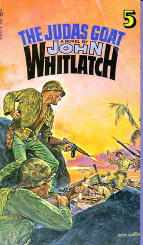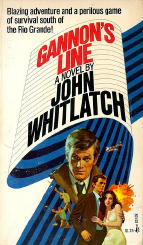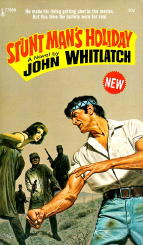Tue 1 May 2007
Review: JOHN WHITLATCH – Stunt Man’s Holiday.
Posted by Steve under Authors , Bibliographies, Lists & Checklists , Crime Fiction IV , Reviews[3] Comments
JOHN WHITLATCH – Stunt Man’s Holiday
Pocket 77660; paperback original; 1st printing, May 1973.
I don’t know very much about John Whitlatch, and I don’t know anyone who does. In many, many ways he was the last of the true pulp fiction writers, even though his first book was published in 1969. Between then and 1976 he wrote 11 novels in a wide range of categories for Pocket, ten of them in one four years period.
All of them paperback originals – crime, adventure, westerns, war, motorcycle gangs, the whole gamut. The titles were not all that remarkable, but the covers – the covers were lurid and eye-catching, and the books were reprinted over and over again. One presumes that they sold well.

Only three of them were listed in Crime Fiction IV, by Allen J. Hubin, but in Addenda #10 a complete revision of his entry now includes all of the books he wrote, as follows:
WHITLATCH, JOHN. No biographical information is known about this author of eleven popular pulp fiction paperbacks in the 1960s and 70s. While specific genres, settings and time periods vary widely, there is a criminous element in each of them. With Tom Power, one of the survivors of the event, John Whitlatch later co-authored Shoot-Out At Dawn (Phoenix Books, pb, 1981), an account of what took place at a remote Southern Arizona cabin in 1918. SC: John Gannon = JG; Captain Jamey Morgan = JM.
Gannon’s Vendetta. Pocket 75383, pbo, 1969. JG “Do not forget, gentlemen – violence is the only thing they understand. If in doubt, kill.”
Morgan’s Rebellion. Pocket 75384, pbo, 1969. “Prison made a man of Morgan. And the man became a legend.”
Tanner’s Lemming. Pocket 75616, pbo, Sept 1970. “Tanner – the man who single-fistedly quashed a student takeover and tongue-lashed its leaders into silence at a turbulent school-board showdown. Tanner – the man who had never flown a plane, yet took the stick when a pilot died in midair and landed safely. Tanner – the man whose blunt business sense had won him a place in a Senator’s inner circle. Tanner – had he blown a hole in the heart of the man millions of Americans revered? Had he killed Senator Stanton? Could he have been the assassin?”
The Iron Shirt. Pocket 75642, pbo, 1970. [West] “Jonathan Fontaine swore it … in the smoking remains of his homestead, over the charred, mutilated body of his young daughter. He had gone East but now was back in Arizona with a specially equipped rifle. And he had a fresh lead on the Indian – the one who had worn a necklace of human fingers and The Iron Shirt.” [Marginal: primarily a Western.]
The Judas Goat. Pocket 75643, pbo, 1970. “Hand-picked from the entire US World War II army, they were a unique company. Twelve men led by a lieutenant, as able as he was arrogant, and a sharp, seasoned sergeant who was militantly silent about his past. Twelve fighters, among them an ugly man, a black man, on old World War I scout, a southern redneck, and a mountain climber. They were a strange assortment, but tough and tenacious – and they didn’t care too much about living. To the General they were the army’s answer to the marines. To the Colonel they were a crack team … the best he could assemble. To the Lieutenant they were ‘animals.’ And by the time their brutal training had ended they were Killers!”

Lafitte’s Legacy. Pocket 75670, pbo, Sept 1971. [Louisiana] “The last of the Lafittes had come back from Arizona to visit his dying grandfather. But enemies lay in wait, blcoking his way with fallen trees, terrorizing his wife with poisonous snakes, signalling their malice with voodoo dolls. Someone wanted the old treasure map that was his legacy. But his adversaries had not reckoned with the pirate blood that was also part of Lafitte’s legacy. He would fight with all the guile and guts, tenacity and ingenuity that had made his legendary ancestor the terror of the bayou.”
Frank T.’s Plan. Pocket 77587, pbo, Oct 1972. “To avenge his daughter’s death, an old man pits himself against the most violent forces of evil.”
Stunt Man’s Holiday. Pocket 77660, pbo, May 1973. [Arizona] “He made his living getting shot in the movies. But this time the bullets were real.”
Cory’s Losers. Pocket 77661, pbo, May 1973. “The little western town was full of crooked operators – and Cory wanted revenge on every one of them.”
Morgan’s Assassin. Pocket 77659, pbo, Aug 1973. “A squad of mean, smart killers was out to bring the nation to its knees. Only one man was tough enough to stop them –El Arquito!”
Gannon’s Line. Pocket 80743, pbo, Oct 1976. [Mexico] JG “Blazing adventure and a perilous game of survival south of the Rio Grande!”

Victor Berch has checked the copyright records for the earlier books, and from the evidence found he says, “John Whitlach seems to be a real name. There was no indication in the records that this was a pseudonym.” Also interesting is the fact that, he goes on to say, “Nor are there any renewal records for any of his 1969 books.”
Stunt Man’s Holiday is a crime novel, and in a more than minor way, it’s even a “fair play” detective story. Max Besh is the stunt man that the title advertises, not to mention a full-blooded Apache who needs all of his heritage, as it turns out, to follow a gang of bank robbers on a long, exhausting chase through the Arizona desert after they kidnap the girl he’s traveling with, along with the wife of a Don Rickles look- (and act-) alike Jewish comedian named Les Rick.
And that’s the entire plot right there, summed up in only one sentence, even allowing for the fact that it’s a long one, which I grant you. Les Rick starts out being deliberately unlikable, but he gradually shows his worth (if not his innate cowboy ability) by accompanying Max the entire distance, by which I mean the entire book. Here’s an example of Max’s tracking skills, taken from page 132, where Rick asks if they’re getting closer:
“Huh!” Rick said with amazement. “But what’s this about the manure?”
“Well,” Besh said, with his first grin in several hours, “it’s not exactly like reading tea leaves, but you can tell this much from examining the droppings. Fresh manure is moist and dries as it ages. So in seventy- to eighty-degree weather you can make a rough guess as to two, three days. But what I’ve seen today is too dry already to make a guess.”
“I’ll be damned!” Rick said …

The writing is competent enough, but as the excerpt shows, it may also be straightforward to a fault. And in all honesty, if you haven’t gathered where I’m headed already, as opposed to the opening scenes that take place in Las Vegas, the rest of the tale is rather skimpy in plot. Take the long trek in the desert, for example, in which (in retrospect) nothing really happens, except to allow the reader to watch as Besh and Rick, natural-born opposites, react against the other and get to know (if not understand) each other more.
Nonetheless, what Whitlatch is rather adept and clever at, in this book at least, is in making the reader think something is happening – a hint here, building an anticipation there, adding to the puzzle now and again – when perhaps the something that is happening is a whole lot less. The ending, which is rather violent – all of a sudden, you see, things really do start to happen – is what the reader has been eagerly waiting for, he suddenly realizes, and he is finally rewarded. (Not many women will read John Whitlatch’s books, I suspect, but as always, I may be wrong.)
What was unexpected, on the other hand, is that – as I mentioned earlier – this is a detective story of sorts. Not everything is what it seems, and since it is fairly obvious that it is not, I do not believe I am revealing anything I should not be. There are clues as to what is going on, in other words, if one reads slowly enough. But because they are not emphasized, it is easy to lose track of them as the story heads off in another direction, which it does.
Or to be more specific, the crux of whole affair depends upon what was discovered way back on page 86. If you’re paying attention, and make yourself notes of what’s happening when it happens, you’ll have it figured out at the same time that Besh does, guaranteed – but he’s not talking. And Rick– as early into his education of the way of the west as it is when it happens – don’t count on him. He’s simply not swift enough.
All in all, though? Not entirely what I expected. Whether that’s good or bad, I leave for you to decide.
PostScript: For a Gallery of all the Whitlatch covers, check out this page on the primary Mystery*File website.
January 6th, 2010 at 11:34 am
I am female & love John Whitlatch books. I have most of them & Am always on the lookout for more. Whenever I check at my bookstores they are always listed as out of print. I don’t like buying sight unseen over the net, you never know what you’re getting. If you know a legit place I can find them I’d love to hear about it.
January 6th, 2010 at 2:28 pm
Whitlach’s books are definitely out of print, and I kind of doubt that anyone is going to reprint them. Nor do they show up in used book shops anymore — I can’t remember seeing any in several years.
I’d say that finding them online is your best bet, but I know what you mean about not knowing what you’re getting. But Amazon (for example) does have a full money back guarantee, as do all reputable booksellers.
January 7th, 2010 at 11:29 pm
No, I’m not a relative, but I have always been fascinated with John’s work. Our surname is not common so I bought all of his works at one time or another. Ebay is a good source too.
Good Hunting
Al